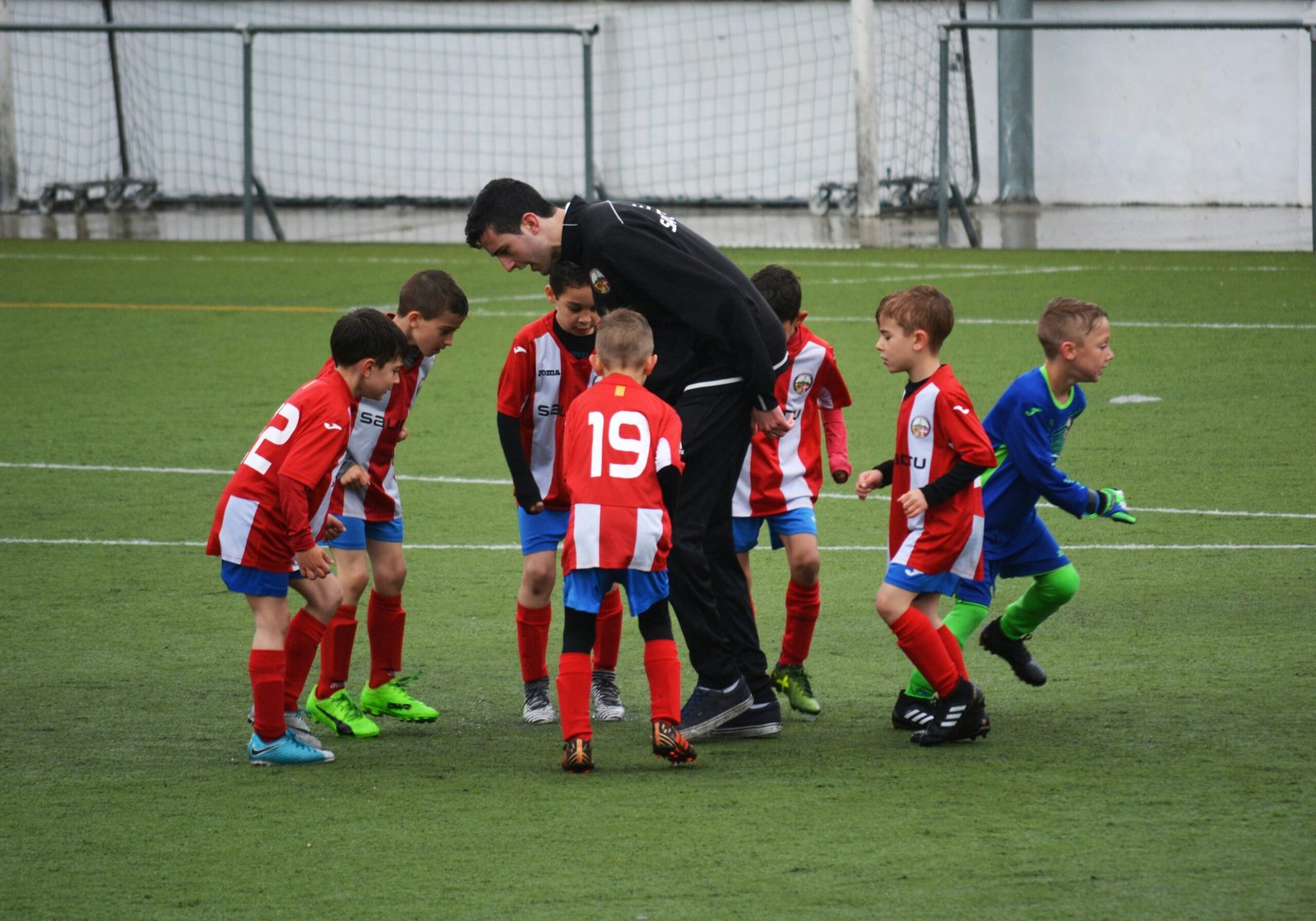10 Great Steps How to Become a Soccer Coach: Earn, Inspire, Succeed!

How to Become a Soccer Coach: Your Step-by-Step Training and Certification Guide
Meta Description
Learn how to become a soccer coach with our step-by-step guide. Get certified, gain experience, and lead your team to success. Start your coaching journey today!
Introduction
Ever dreamed of how to become a soccer coach with your own soccer team? Imagine leading players to victory, strategizing game-winning plays, and inspiring future soccer stars. Sounds exciting, right? But wait—do you know how to turn that dream into reality? If you’ve ever wondered, “How do I become a soccer coach?” you’re in the right place.
Buckle up! We’re about to walk you through the process—from certifications to secret coaching tips—that will have you ready to hit the field in no time. By the end, you’ll have everything you need to get started on this rewarding career. Let’s kick things off!

Text on Image:
“Become a Soccer Coach: Lead, Inspire, Succeed!”
Table of Contents
- Why Become a Soccer Coach?
- Step 1: Know Your Why and how to become a soccer coach
- Step 2: Build Your Coaching Skills
- Step 3: Volunteer as an Assistant Coach
- Step 4: Get Certified to become a soccer coach
- Step 5: Gain Experience
- Step 6: Network Like a Pro
- Step 7: Land Your First Coaching Job
- Step 8: Play and Learn the Game
- Step 9: Understand Your Earning Potential when you become a soccer coach
- Step 10: Create Winning Training Sessions
- Bonus Tips for Success
- Quick Recap
First, Why Become a Soccer Coach?
Think about it: soccer isn’t just a game. It’s a global phenomenon. Over 265 million people play the sport, and fans pack stadiums around the world. Coaching soccer isn’t just about teaching skills. It’s about building confidence, creating a team culture, and making memories that last a lifetime.
Still wondering if it’s worth it? Consider this:
- Youth soccer coaches can earn $15–$30 per hour, depending on experience.
- Professional coaches? They can rake in six-figure salaries or more!
- Plus, you get to be part of a community where the love for soccer runs deep.
And yes, it can be a rewarding career financially too. According to data from various coaching associations, entry-level youth soccer coaches can earn between $25,000 and $40,000 per year in the U.S., while professional-level coaches can make six-figure salaries or more depending on their experience and the level they coach at.

Now that we’ve set the stage, let’s dive into how you can become a soccer coach. Spoiler alert: It’s easier than you think, and it doesn’t require being a pro player.
Step 1: Know Your Why and how to become a soccer coach (Because Motivation Matters!)
Before you get into the nitty-gritty of training and certifications, ask yourself: Why do I want to how to become a soccer coach?
- Is it because you love the sport and want to give back?
- Do you enjoy working with kids or athletes and helping them grow?
- Are you looking for a career switch or a fun side hustle?
Your “why” will keep you going when things get tough. And trust me, there will be days when your team isn’t listening, the weather is awful, or the games aren’t going your way. But if your heart’s in it, you’ll push through.
Ready to move forward? Let’s talk about the skills you’ll need.
Step 2: Build Your Coaching Skills to Become a Soccer Coach (Hint: It’s Not Just About Soccer)
Sure, you need to know the game inside and out. But coaching is about more than teaching someone how to dribble or shoot. You need to be:
- A Great Communicator: Can you explain tactics clearly? Motivate your players after a loss?
- Patient: Every player learns differently. Some will pick things up quickly, others… not so much.
- A Leader: Your team will look up to you for guidance. How you handle wins and losses will set the ton

Pro Tip: Volunteer to assist a local coach. Watching how they manage practices and games is a goldmine for learning. Plus, it’ll give you a taste of what coaching involves before you fully commit.
Step 3: Volunteer as an Assistant Coach as you learn how to become a soccer coach
Experience is everything. Volunteering with a local club or school team is a great way to get your foot in the door. As an assistant coach, you’ll learn the ropes—how to run training sessions, communicate with players, and handle game-day pressure.
Example:
Many top coaches started this way. Pep Guardiola, before leading FC Barcelona to greatness, started coaching their B team. Similarly, José Mourinho began as an interpreter and assistant coach before becoming a legend.
Step 4. Get Certified (Yes, You Need That Paperwork!)
Now comes the official part—certifications. But don’t worry, it’s not as daunting as it sounds. Here’s the scoop:
Beginner Level:
Start with the basics of how to become a soccer coach
- United Soccer Coaches (USC) Foundations Courses: These online courses are great if you’re coaching youth teams. They cover essentials like safety, communication, and age-appropriate drills.
- US Soccer Grassroots Pathway: This offers 4v4, 7v7, 9v9, and 11v11 coaching licenses. Think of these as stepping stones to bigger opportunities.
💡 Fun Fact: Did you know that most youth leagues require at least a Grassroots License? It’s your ticket to officially coaching teams.

Intermediate Level:
Ready for more?
- D-License: This is where things get serious. You’ll dive into advanced soccer tactics, player psychology, and game management. It’s perfect for those learning how to become a soccer coach for high school teams.
Advanced Level:
Dreaming of coaching professionally?
- USSF C, B, and A Licenses: These are the big leagues. The higher the license, the more competitive the job market you can enter.
- UEFA Licenses: If you want to coach internationally, these are a must-have.
Licences Pathway in US
- Grassroots License: Ideal for beginners, covering the basics of coaching youth teams.
- D License: Focuses on developing players aged 13 and older.
- C License: Prepares youhow to become a soccer coach for competitive youth teams.
- B License: Required to coach at the college or semi-pro level.
- A License: The highest certification, qualifying you to coach professional teams.
UEFA Coaching Pathway (Europe)
- UEFA C License: Entry-level license.
- UEFA B License: Allows you to become a soccer coach for amateur teams and youth academies.
- UEFA A License: Prepares you for senior teams and semi-professional soccer clubs.
- UEFA Pro License: The highest level, mandatory for coaching in top professional leagues like the Premier League or La Liga.
Pro Tip: Each level requires coursework, practical assessments, and mentorship from experienced coaches. Expect to invest time and money, but it’s a necessary step to advance your career Check with your local soccer federation. They often offer grants or scholarships to help cover certification costs.
Step 5: Gain Experience to become a soccer coach (Because Practice Makes Perfect!)
No one becomes a great coach overnight. You need hands-on experience. Start small and build your way up.

- Volunteer: Help out at youth camps or local soccer clubs.
- Assistant Coach: Many clubs are looking for extra help.
- Run Private Clinics: Focus on specific skills like shooting or defending.
The more experience you gain, the more confident you’ll become a soccer coach. And confidence? It’s contagious. Your players will feed off it!
Step 6: Network Like a Pro (Because Who You Know Matters)
Becoming a soccer coachCoaching isn’t just about what you know. It’s about who you know. Building a network can open doors to opportunities you didn’t even know existed.

Here’s how to grow your coaching circle to become a soccer coach:
- Attend Coaching Clinics: Meet other soccer coaches, share ideas, and learn new techniques.
- Join Online Communities: Facebook groups, Reddit threads, and LinkedIn are full of soccer coaching discussions.
- Stay in Touch: Reach out to mentors and fellow coaches regularly. You never know when a job opportunity might pop up!
Step 7: Land Your First Coaching Job (Time to Shine!)
You’ve got the skills, certifications, and experience. Now, it’s time to put it all to use. Start by applying to:
- Local Youth Clubs: They’re always looking for enthusiastic soccer coaches.
- School Teams: High schools and middle schools often need soccer coaches for their soccer programs.
- Community Leagues: A great way to get started and build your reputation.
When applying to become a soccer coach, tailor your resume to highlight your soccer knowledge, leadership skills, and certifications. Don’t be shy about sharing your coaching philosophy and how you’ll develop players both on and off the field.
Step 8: Play and Learn the Game and How to Become a Soccer Coach and Earn
Before you can teach the game, you need to understand it deeply. While you don’t need to be a former professional player to become a soccer coach, having experience playing soccer helps you grasp the nuances of the sport—things like positioning, tactics, and team dynamics.

Here’s how you can start:
- Play for a Local Club: Join a local team to experience match situations firsthand.
- Watch Soccer Religiously: Analyze professional games, focusing on formations, substitutions, and how coaches adjust tactics mid-game.
- Study the Game: Read books like Inverting the Pyramid by Jonathan Wilson to understand the evolution of soccer tactics.
Step 9: Understand Your Earning Potential
How much can you earn when you become a soccer coach? Well, it depends on the level and location:
- Youth Level: $25,000 – $40,000 per year.
- High School Level: $35,000 – $50,000 per year.
- College Level: $50,000 – $100,000 per year.
- Professional Level: $100,000 to millions annually, depending on the league and team.
Some professional coaches in top leagues earn multi-million-dollar contracts. For example, Diego Simeone, coach of Atlético Madrid, earns around $3.6 million per month
Step 10: Create Winning Training Sessions
Planning effective training sessions is crucial to become a soccer coach. Each session should have:
- A Clear Objective: Focus on specific skills like passing, shooting, or defensive positioning.
- Progressive Drills: Start with basic exercises and gradually increase difficulty.
- Game-Like Situations: Simulate match conditions to prepare players for real games.
Example:
A session focusing on passing might start with simple one-touch drills, progress to small-sided games, and end with a full scrimmage emphasizing quick, accurate passing.
Bonus Tips for Success
Want to stand out as a soccer coach? Here are a few extra tips:
- Stay Updated: Soccer is always evolving. Keep learning new tactics and techniques.
- Be Positive: Players respond better to encouragement than criticism.
- Have Fun: At the end of the day, soccer is a game. If you’re having fun, your players will too.
Ready to Kick Off Your Coaching Journey?
Now you know how to become a soccer coach—from finding your “why” to gaining experience and landing that first job. It’s a journey filled with challenges, but also incredible rewards.
So, what are you waiting for? Lace up those coaching shoes, get certified, and start making a difference in the world of soccer. Your team is waiting for you!
Quick Recap ON how to become a soccer coach
- Know your “why” and build essential skills.
- Get certified through programs like the US Soccer Grassroots Pathway.
- Gain hands-on experience and grow your network.
- Apply for coaching positions and tailor your resume to stand out.
Now, it’s your turn to lead the next generation of soccer stars. Ready to start after we guided you on how to become a soccer coach? Let’s go! ⚽
Hashtags
#SoccerCoach #CoachingTips #SoccerTraining #YouthSoccer #SoccerLife #CoachingCareer #SoccerSkills #CoachLife #FootballCoach #SoccerDevelopment





